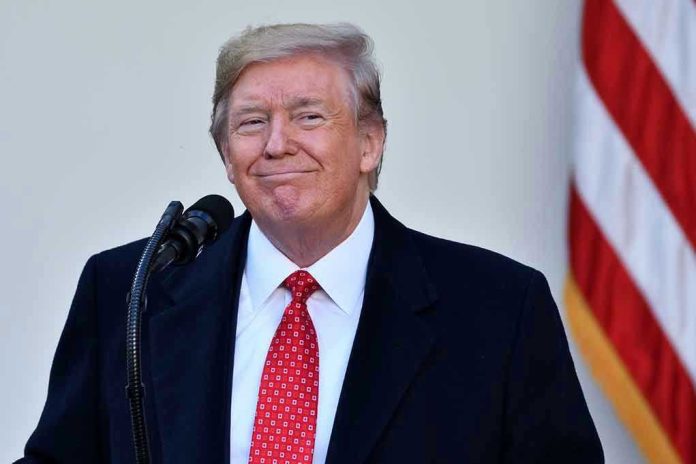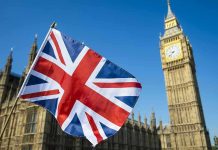
Imagine the most contested ground in sports and politics—a new NFL stadium in Washington, D.C.—emblazoned not with a corporate logo, but with the name of a sitting president, with the White House itself calling it “beautiful.”
Story Snapshot
- The White House publicly endorsed naming the new Washington Commanders stadium after President Trump, calling the idea “beautiful.”
- This marks the first time a sitting U.S. president has actively sought—and received executive backing—for a major sports venue to bear their name.
- The stadium project, at the historic RFK site, stands at the crossroads of sports, politics, and national branding.
- Key city, federal, and team stakeholders remain silent on the final naming decision, fueling heated public and political debate.
White House Endorsement Shocks NFL and Political Insiders
President Donald Trump’s campaign to have the new Washington Commanders stadium named after him has upended expectations about where the lines between sports promotion and presidential legacy are drawn. The White House, through press secretary Karoline Leavitt, shocked observers by calling the proposal “beautiful,” citing Trump’s pivotal role in moving the stadium project forward and shifting the RFK Stadium site from federal to D.C. control. This explicit executive endorsement—the first of its kind—sent ripples through the NFL, city politics, and the wider American public.
Trump’s ambitions go beyond mere symbolism. In a year marked by intense debate over the Commanders’ identity, he threatened to block stadium construction unless the team reverted to its old “Redskins” name, leveraging both cultural nostalgia and political clout. The White House’s public support for the stadium naming, however, has transformed a controversial wish into a matter of national conversation, raising questions about the future of sports branding and presidential influence.
Historic Context: A Convergence of Power, Legacy, and Location
The stadium’s planned location at the old RFK site is not accidental. RFK Stadium once embodied the glory days of Washington football, hosting legendary teams in the 1980s and 1990s. Since the team’s move to Maryland in 1997, city leaders and fans have longed for a return, seeing it as a chance to revive both civic pride and economic fortunes. The $4 billion project is not just a stadium; it’s a blueprint for urban redevelopment and a test of how American cities balance history, politics, and progress under the national spotlight.
No sitting president has ever had an NFL stadium named after them. While the Commanders own the naming rights, the ultimate decision will require coordination with the D.C. Council and the National Park Service, which governs the land. The White House’s involvement, unusual in its openness, adds a layer of political theater rarely seen in the sports world.
Power Brokers, Silent Stakeholders, and the High-Stakes Game
The main players in this arena are well-known: President Trump, seeking not only legacy but direct recognition; Commanders owner Josh Harris, whose group controls the lucrative naming rights; and D.C. officials, including Mayor Muriel Bowser, who must weigh economic benefits against potential backlash. The National Park Service, often overlooked, holds sway over final land use agreements. While the White House has been vocal, both the team and city leaders have declined public comment, leaving the real negotiations shrouded in secrecy and speculation.
The Commanders’ fan base and the wider D.C. community remain divided. Some see Trump’s involvement as a reward for his role in making the project possible, while others argue it politicizes a cherished community institution. The D.C. Council’s September 2025 vote to approve the stadium (11-2) signaled broad but not unanimous support for redevelopment, but the naming issue has opened a new front in the culture wars that have long surrounded the franchise.
Economic Fallout, Social Fractures, and What Comes Next
Stadium naming rights in the NFL routinely fetch hundreds of millions of dollars from corporations eager to brand themselves on the nation’s biggest stage. Trump’s proposal threatens to upend that model, potentially costing the team significant sponsorship revenue. For some, the idea of a presidentially named stadium is a fitting tribute to political leadership; for others, it’s a troubling precedent that blurs civic, commercial, and partisan lines.
Public debate has only intensified since the White House’s statement. Supporters claim Trump’s direct role in securing the stadium makes the naming proposal logical, even just. Critics warn it could polarize fans and deter corporate partners, changing stadium branding and presidential legacy for generations. The final decision—expected after further meetings between the Commanders, D.C. officials, and federal agencies—will set the tone for the intersection of politics and sports in America’s capital for years to come.
Sources:
WTOP: Trump wants his name on new Washington Commanders stadium in D.C.
CBS News: Washington Commanders new stadium after Trump






